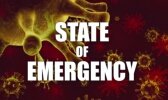
There is a growing fear among many in the legal profession that the courts are no longer an instrument of justice. Laws, rules, and definitions are being constantly manipulated to push the perpetual mantra of ‘getting vaccinated,’ which has all along been the objective even before anyone ever heard of coronavirus.
The Ontario Human Rights Commission recently ruled that “requiring proof of vaccination to protect people at work or when receiving services is generally permissible.”
Given the nature and dismal record of the so-called ‘vaccines’ in question, the ruling is immoral, irrational, and futile. Even those pushing the vaccines admit that the ‘vaccines’ offer no protection against getting or spreading the ‘virus,’ no matter the variant being offered on any given day.
Many rightly consider the vaccine mandates to be a violation of their rights even though that may not be the case in law. Justified by declaring a ‘state of emergency,’ it appears that governments are permitted to violate rights and impose restrictions on individual freedom without limits.
In the face of a tyranny unlike any experienced in the West, those who believed they had fundamental rights and freedoms are fast learning that such fundamentals have no place in a world of perpetual emergencies. This presents a dilemma. How can it be possible to restore individual freedom and to prevent lockdowns and mandates of this nature from ever happening again in the future?
To tyrants and dictators, the necessity and role of emergencies is self-evident: by declaring an ‘emergency,’ a path is cleared to violate individual rights, thanks to what might be called a broad acceptance of ‘emergency ethics.’ The problem with the political ‘Covid’ narrative is that it requires a perpetual flow of propaganda, lies, censorship, mandates, and restrictions to keep people from learning that it is false. But the reality of the ‘vaccines’ and the ‘adverse’ reactions to their use is mounting to a point where the current official narrative can no longer be sustained. What then?
In her essay entitled The Inexplicable Personal Alchemy, philosopher-novelist Ayn Rand observed:
“This is the ultimate penalty of all dictators (and all liars): their nemesis is those who believe them. A dictatorship has to promulgate some sort of distant goals and moral ideals in order to justify its rule and the people’s immolation. The extent to which it succeeds in convincing its victims is the extent of its own danger. Sooner or later, its contradictions are thrown in its face by the best of its subjects: the ablest, the most intelligent, the most honest.”
The rule of lawlessness is a moral and philosophical crisis, not a medical, legal, or political one, despite the fact that those are the areas where the crisis manifests itself. As Ontario lawyer Bruce Pardy noted, politics and law are “downstream from culture.” Until this is recognized, it will be impossible to make things Just Right again.
If you found this presentation valuable please consider supporting us:
🧡 PayPal


Sorry, the comment form is closed at this time.